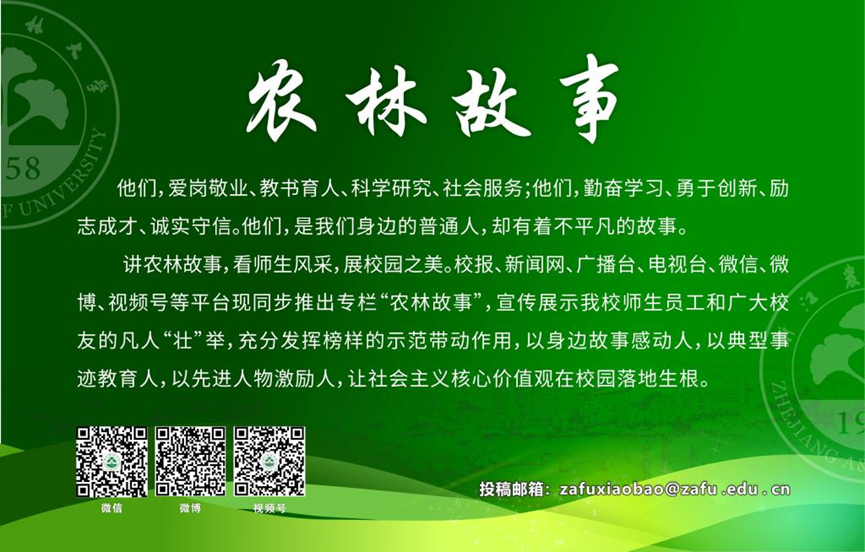
In 2014, the forestry undergraduate education program jointly organized by Zhejiang A&F University and University of British Columbia (UBC) passed the approval of the Ministry of Education of the People's Republic of China and started to enroll students.
In the past 10 years, the forestry program (China-Canada Cooperative Education Program, hereinafter referred to as "China-Canada") has built an international high-level faculty by adhering to the teaching philosophy of “teaching in research, innovation-led, collaborative training”, so as to cultivate students' solid theoretical knowledge of forestry, With the aim of cultivating students' solid theoretical knowledge of forestry, good awareness of ecological civilization, innovative spirit and scientific literacy, as well as continuously improving students' independent and research learning ability and comprehensive competitiveness, the university has cultivated a large number of internationally competitive and innovative modern forestry talents who understand the cutting-edge forestry science and technology, have an international vision and the concept of modernization of the forestry industry.
Combination of Chinese and Foreign Universities, Gathering Strong Teachers from Both Universities
Zhejiang A&F University is a key university in Zhejiang Province, and a dual-provincial-ministry joint university between the People's Government of Zhejiang Province, the Ministry of Agriculture and Rural Development, and the State Forestry and Grassland Administration, and its forestry disciplines were ranked B+ in the fourth and fifth rounds of the National Academic Discipline Evaluation, and ranked No.3 in China's Soft Science Ranking for five consecutive years, whereas University of British Columbia (hereafter referred to as UBC) is ranked No.34 in the QS World University Ranking 2024, and the School of Forestry of UBC is ranked No.1 in the world, leading the world in forestry research and education. The strong combination of Chinese and foreign parties and cooperation in running schools not only supports the university's forestry discipline to create a first-class discipline, but also responds to the current domestic and international forestry discipline development front and the demand for talents. In the view of Prof. Li Yan, Dean of the College of Forestry, Forestry (China-Canada) is another successful practice of the school's internationalization.
Forestry (China-Canada) adopts the mode of joint cultivation between Chinese and foreign sides, and students can apply to participate in the credit recognition program between Zhejiang A&F University (ZAFU) and UBC after completing a certain number of credits in China. Wang Zhengjia, Executive Vice President of the College of Forestry and Forestry, introduced that the program relies on the solid foundation of forestry majors in our university, introduces UBC's advanced educational concepts, scientific curricula and teaching content, innovative teaching methods, standardized teaching management mode and quality evaluation system and other high-quality educational resources, and conveys young teachers to UBC for study and training through the National Rural Revitalization Project of the State CSC Commission, the Innovative Talent International Cooperative Cultivation Project, and the Youth Backbone Project. Young teachers go to UBC for study and training. “We have constructed an international first-class academic team, fed teaching with scientific research achievements, supported first-class teaching team with first-class discipline team, built a faculty composed of internationally renowned professors and high-level talents at home and abroad, and introduced a team of five international top experts composed of Nobel Prize laureate Academician John Inns, etc., who are paired with the Chinese experts to lead the university's Teachers and students of forestry (China-Canada) class carry out scientific research and teaching practice in the form of course group”.

“The China-Canada Cooperative Education Program provides students with a bilingual teaching environment, where the core courses are all in English or taught by foreign professors, which is a very special experience.” Gong Youquan, a student in Forestry (China-Canada) Class 181, recalled that the first time he was taught by a foreign teacher was by Mr. Frank from UBC, who was very kind and friendly and always guided students to express themselves boldly and discuss positively. “Mr. Frank's class explored every concept involved in depth, and also provided some new perspectives on issues.” Gong Youquan said that this kind of meticulous teaching laid a solid foundation for him, which greatly benefited his subsequent studies.
In order to help students adapt to all-English teaching as soon as possible, and docking international teaching means and teaching methods, LAMS also organizes international students from the university to pair up with students of the project class to help each other, and carry out oral training through a combination of centralized and free dispersed exchanges to promote the students' English proficiency. The bilingual teaching environment allows students to not only master academic expertise, but also improve their language communication skills, preparing them to enter a globalized work environment after graduation.
Guardianship and Innovation, Cultivating Students' Global Competence
Forestry (China-Canada) promotes students' innovation, international exchange, study abroad visits, disciplinary competitions, internships and practical training through the “competition in the classroom” and the team-based education model of “supervisor + young teacher + doctoral student + master's student + undergraduate student”. “The program has promoted the implementation of five types of innovation training programs, and effectively cultivated students' scientific research level and scientific research ability. In addition, the program has introduced foreign high-quality courses including Probability and Mathematical Statistics, General Biology, Professional Education (English for Academic Purposes), Cell Biology, Sustainable Forest Management, Principles of Forest Classification and Silviculture, Forest Plant Biology, Ecology, etc. Some of the online courses of UBC have been opened to the students of Forestry (China-Canada) to realize the sharing of high-quality teaching resources.

During the period when the latest graduates were enrolled, 19 foreign teachers were dispatched and 4 foreign teachers were recruited by both sides. Fifteen foreign courses were introduced, three were co-developed, and 15 were taught by foreign teachers. For students going to Canada for exchange, the corresponding registration management system is implemented according to different types of UBC students or summer exchange students, and there is a special Asian Affairs Office as well as a full-time cooperative program director and assistants to carry out targeted guidance and management.
After ten years of exploration and practice, forestry (China-Canada) has achieved remarkable results in its education model and innovative initiatives. In the past five years, students of forestry (China-Canada) have won more than 40 awards above the provincial and ministerial level in one type of disciplinary competitions, with more than 60 awards. The students of the program not only published several SCI journal papers as the first author, but also participated in many international conferences. Students have thus broadened their international horizons and improved their international communication ability and their comprehensive ability.
“When you need a certain technology or a certain skill, you will realize that you have already been trained for the required ability long ago.” J.M. Ke, who now works as a forest analyst in Canada, feels that his four years of study in Forestry (China-Canada) were enough to enable him to handle his current job with ease. In his work, Ke needs to measure carbon sinks. Although he didn't study this technology separately in his undergraduate program, with the good foundation he laid during his university years in GIS technology, forestry growth modeling, and forest manager science, he was able to master this new technology through self-study and research.
Ke Jinming said that he met classmates and professors from all over the world while studying in Canada, discussed academic topics and participated in projects and research together, also deepened his understanding of different cultural backgrounds, and accumulated valuable work experience and interpersonal relationships, which laid a good foundation for his work in Canada today.
“Our goal is to cultivate high-quality, internationalized, modern forestry professionals who can competently perform forestry-related work on a global scale.” Yuan Huwei, Associate Professor of the College of Forestry and Biological Sciences, introduced that Forestry (China-Canada) not only provides strong support for the overall development of students, but also injects new vitality and momentum into the internationalization process of China's higher education.
Promising Prospects, Providing Wide Employment Options
As of June 2024, a total of 189 students have graduated from forestry (China-Canada). Among them, 96 students chose to pursue further studies, with 43 studying abroad and 53 in China. 32 students graduated from the program in 2024, of whom 24 successfully entered or applied for graduate school at home and abroad, accounting for 75% of the total number of students (the first in the university's advancement rate); all 11 students who applied for further study overseas were admitted by world-renowned universities such as Yale University, Cornell University, the National University of Singapore, the University of Hong Kong, and the University of Toronto.

In addition to pursuing further studies in famous universities at home and abroad, some graduates have taken the initiative to join the national and local economic construction, joining multinational corporations and large-scale state-owned enterprises, etc., while others have played an important role in government departments and institutions, contributing their talents to the modernization and revitalization of the countryside. Due to the high quality and internationalization characteristics of talent cultivation, graduates have strong competitiveness in the job-seeking process and are generally recognized by employers.
“Whether to go abroad? When to take IELTS? What GPA to keep?” Students of Forestry (China-Canada) will have a clearer plan for their life earlier. “When the route of life is planned early, it will make us have a clearer goal, compete for more time, and cherish our study, life and time with classmates in China more.” Gong Yuquan shared.
“This program has greatly enhanced my career competitiveness. Firstly, it gave me a stronger international perspective and English language skills, allowing me to directly participate in international cooperation projects. Secondly, the study experience and exposure to cutting-edge technology at UBC allowed me to better understand global forestry development trends.” Shi-Chun Wu from Forestry (China-Canada) is currently pursuing her master's degree at the University of Toronto. She hopes that she can work in forest conservation and sustainable development in government or international organizations in the future.
“A clearer perception of oneself, a higher first degree, more possibilities, a broader international perspective, a stronger sense of social responsibility and a stronger professional competitiveness.” This is how Ke Jinming summarizes how the Forestry (China-Canada) learning experience has added to his life.
With excellent teaching resources, mature cultivation system and innovative cultivation mode, Forestry (China-Canada) has exported a lot of excellent forestry talents to the world's forestry industry. In the future, the university will continue to strengthen the cooperation with excellent universities around the world, cultivate more internationalized modern forestry talents, and contribute more wisdom and strength of ZAFU students to the development of China and even the world forestry industry.
(Hao Puyu, News Center; Zhou Jie, Zhong Ding, Student News Agency)